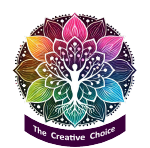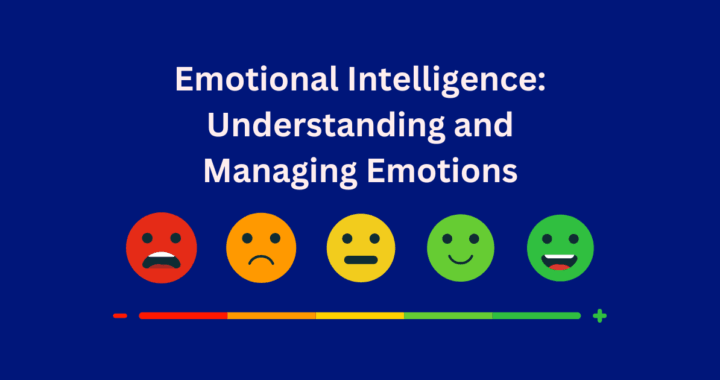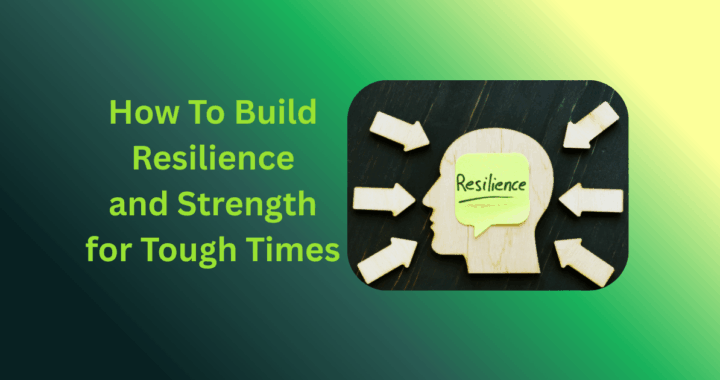What’s more important in life – a college degree or emotional intelligence? For me, the answer is easy – it’s emotional intelligence every time. Let me tell you why.
Emotional intelligence helps me find my way through the ups and downs of daily life, manage relationships, and understand myself better. While many people talk about the importance of intellect or IQ, it’s emotional intelligence, often called EI or EQ, that often plays a bigger part in my overall happiness and ability to thrive. And I see that in others, too.
So whether you’re looking to grow personally or add more depth to your spiritual adventure, getting to grips with emotional intelligence opens doors to better mental health, improved communication, and much stronger relationships.
 This article contains some affiliate links, which means that if you decide to buy, I may receive a small commission at no extra cost to you. As an Amazon Associate, I earn from qualifying purchases. This helps me keep The Creative Choice growing and free for readers. I appreciate your support. For more information, see our Affiliate Disclosure.
This article contains some affiliate links, which means that if you decide to buy, I may receive a small commission at no extra cost to you. As an Amazon Associate, I earn from qualifying purchases. This helps me keep The Creative Choice growing and free for readers. I appreciate your support. For more information, see our Affiliate Disclosure.
What is Emotional Intelligence?
Emotional intelligence, or EI, covers the way we recognise, understand, and manage our own emotions, as well as how we relate and respond to the emotions of others. Psychologists John Mayer and Peter Salovey introduced the term in the 1990s, and author Daniel Goleman later made it popular with his books. Unlike IQ, which measures logic and reasoning, emotional intelligence is about how people handle feelings and relationships. It includes self-awareness, self-regulation, motivation, empathy, and social skills.
I often think of emotional intelligence as the user’s guide I wish I had been given at birth, and this website is really the result of my search for answers about how to really operate in this human body.
If I know how I’m feeling and why, I’m much less likely to say something I regret or bottle up stress until I burst. At the same time, when I notice that a friend seems worried, anxious or depressed, my ability to empathise and respond calmly can hopefully make a real difference. I have seen this personally with my two foster children, who have needed a steadying and calm guiding light as they have grown up.
Even more, I’ve realised that emotional intelligence supports me through the everyday moments that shape who I am, from how I respond to setbacks to how I celebrate success.
And it can do the same for YOU!
The Five Key Elements of Emotional Intelligence
The best way for me to explain emotional intelligence is to split it into five practical parts:
- Self-Awareness: Recognising our emotions and how they affect our behaviour. This might mean noticing when we get grumpy after skipping breakfast (hangry), or realising we feel nervous before a big meeting.
- Self-Regulation: Managing impulses and emotions so we don’t overreact or bottle things up. For example, learning to pause before replying to criticism.
- Motivation: Staying committed and enthusiastic, even when things get tough. This is key if you want to push through setbacks and focus on bigger goals.
- Empathy: Understanding how others feel and seeing things from their perspective. If you take a moment to check in on a friend, or listen without jumping in with instant solutions, you’re practising empathy, showing compassion and noticing the real person underneath the chaos.
- Social Skills: Building and maintaining healthy relationships. This includes everything from saying thank you to resolving disagreements calmly and professionally. It also means learning to balance listening and expressing yourself in ways that encourage a genuine connection rather than an “I’m right, you’re wrong” attitude.
Most people are naturally stronger in some areas than others. I, for one, have always found empathy easy, but I’ve had to work harder on not bottling things up. Developing these elements is a gradual process; each part complements the others and will strengthen your overall well-being if you stick with them and do the inner work they require.
Here are some practical things to do to develop these areas
1. Self-awareness
- Keep a daily journal – write down what emotions you noticed during the day and what triggered them
- Check in with your body – notice physical signals (tight chest, clenched jaw, butterflies) as early signs of emotions
- Pause for reflection – before reacting, ask “What am I feeling right now? Why?”
2. Self-regulation
- Practise the ‘pause’ – count to five before replying in emotionally charged situations
- Breathing exercises – slow, deep breaths help calm your nervous system and focus before making decisions
- Reframe negative thoughts – e.g. turn “I always mess this up” into “This is hard, but I can learn from it”
- Develop rituals for stress – walking, stretching, listening to music, or having a mindful cup of tea
3. Motivation
- Set clear, meaningful goals – break them into small, achievable steps
- Visualisation – imagine the outcome you want and how you’ll feel achieving it
- Celebrate small wins – tick off progress to build momentum
- Link tasks to values – e.g. “I’m writing this article not just for work, but because helping teachers makes a difference”
4. Empathy
- Active listening – give full attention, don’t interrupt, and summarise what the other person said
- Ask open questions – “How did that make you feel?” instead of “Are you okay?”
- Notice non-verbal cues – body language, tone of voice, and energy shifts
- Step into their shoes – ask yourself, “If I were them, what would I need right now?”
5. Social skills
- Practise gratitude – say thank you often and mean it
- Learn to give feedback kindly – balance honesty with encouragement
- Resolve conflicts calmly – focus on the problem, not the person
- Strengthen connections – check in with colleagues or friends with a quick message, even when there’s no agenda

Benefits of Improving Emotional Intelligence
Improving your emotional intelligence will help in almost every area of your life. Work gets easier when you can handle feedback gracefully and avoid office politics. Your relationships will get more rewarding when you can communicate openly and show understanding. Even your own spiritual practice will benefit if you are able to sit with uncomfortable emotions rather than run away from them.
There’s plenty of research to back up these benefits. For instance, studies show that people with high EI tend to have lower stress, fewer workplace conflicts, and higher overall satisfaction in life. One Harvard Business Review article points out that strong emotional intelligence is often what separates great leaders from average ones.
In my own life, I’ve noticed that the more I make space for emotions, both my own and those of others, the smoother relationships become and the less stress I carry with me day to day.
Quick Guide to Practising Emotional Intelligence Every Day
Developing emotional intelligence is a bit like getting better at a sport or a musical instrument. It takes regular attention and a willingness to learn from your experience. Here’s a down-to-earth guide that I find really helpful to begin with:
- Pause and Name the Feeling: Before reacting to anything, try to notice and name the emotion you are feeling. Ask yourself if you are angry, embarrassed, excited, or simply tired and hungry. Giving emotions a label will help you respond thoughtfully rather than heatedly in the moment.
- Take a Breath: When things, especially emotions, heat up, simply taking a few deep breaths or stepping outside for some fresh air can help you stay in control and reduce the feeling of overwhelm or stress. Creating this space to pause and choose your response rather than reacting automatically will allow you to make better decisions and be less likely to say or do something you later regret.
- Check Your Stories: Sometimes people react to what they think is happening rather than what is really going on. This occurs because we tend to delete, distort or generalise incoming sensory data coming into our minds. Ask yourself if you are making assumptions about the situation, or can you check the facts before reacting?
- Use Active Listening to Understand: In conversations, always use active listening. This means focusing on what the other person actually says, rather than planning your reply or jumping in with advice before they have even had the chance to speak.
- Share Honestly but Kindly: Expressing your own needs and feelings clearly is part of emotional intelligence. But there are ways to do this without blaming or criticising anyone else, and this keeps relationships healthy. Being honest about what’s going on for me often leads to more authentic connections.
If you repeat these steps, even when it feels awkward or slow, they get easier and more natural. Over months and years, what started as a conscious effort will become second nature, like driving a car and will spill over into every part of your life.
Obstacles And What You Can Do About Them
Sometimes, no matter how well I know the advice, my emotional intelligence flies out the window and I find myself reacting rather than responding. This is natural and completely human so don’t beat yourself up if it happens to you.

Here are a few hurdles I often meet, along with what I do to get back on track:
- Overwhelmed by Emotions: If I feel totally swamped, I remind myself to take things one at a time. Writing down my feelings, going for a walk, or having a chat with someone who listens helps a lot. When overwhelm strikes, self-love and compassion become paramount if you want to stay in charge and avoid negative self-talk that can spiral downwards pretty quickly.
- Reacting Without Thinking: At times, I make mistakes, like everyone. Sometimes I blurt out something thoughtless, especially to those I love, but instead of beating myself up, I apologise and reflect on what triggered me because I now realise that I am the one who lost control of myself, rather than anything the other person did. Taking responsibility for my actions is key, and learning from moments like this will help you, too.
- Struggling to Recognise Emotions: This is not something that happens often for me, but when it does, it’s usually something that I consciously recognise as a destructive emotion, such as jealousy, so my subconscious mind tries to hide it as something else! Don’t let these things go unnoticed, though – journal your thoughts and feelings and allow yourself to feel them, then investigate the triggers and do the work to release them.
- Other People’s Reactions: Sometimes people aren’t in a space where they are able or interested in having open conversations about feelings, or anything, if they are in red mist themselves. In these moments, the thing to do is to manage my own emotions and not take their reactions personally. I’ve learned to respect boundaries while still modelling the kind of emotional awareness I value. This has been especially valuable when dealing with children or younger adults, who may not have the maturity or experience to know better.
Tips for Handling Emotional Overload
If you find yourself being unable to handle emotions on a regular basis, you may be suffering from stress, mental health issues or fatigue. These can weaken your physical and mental immune system and you should address this immediately.
You can find some ideas and practical tips on how to reduce stress here.
Managing Triggers
Everyone has triggers, those little things that just seem to set you off and raise your stress level without you even thinking about it. But therein lies the key – triggers are things that set off your automatic thoughts (usually negative ones) and are the things you don’t consciously think about which affect your mood, self-talk and physiology.
 My own list includes some of the people I feel closest to, funnily enough. But then I am often a trigger for them, too.
My own list includes some of the people I feel closest to, funnily enough. But then I am often a trigger for them, too.
You may find you have triggers such as:
- Something someone says
- The way someone looks at you
- Certain situations (like getting into a lift or phobias)
- The things people wear
- The attitude you believe people have
The list is really endless because it depends on your perspective and personal experiences.
The more aware you become of your triggers, however, the earlier you can notice their effect and feel yourself getting tense. In these moments, it is imperative to stop and remind yourself that these reactions are caused by your subconscious taking control, which is normal, AND that it is possible to pause, reset, and choose a different and most often better way forward. By doing this and making the unconscious conscious, you will be able to lessen their impact daily.
Tools and Techniques for Building Emotional Intelligence
There’s no shortage of advice out there, but there are some tools and techniques that I keep writing about because they actually work. Here are a few you can use today:
- Mindful Breathing: A simple breathing exercise, like counting as I inhale and exhale, helps me notice what I’m feeling without judgment
- Journalling: I write about my emotions and experiences, even just a few lines. This helps me spot patterns in how I react to certain situations
- Body Scans: This is a mindfulness technique where I pay close attention to different parts of my body. Tight shoulders, clenched jaws, or butterflies in the stomach often say more than my thoughts do
- Feelings Wheel: Sometimes I use a visual tool (just look up “feelings wheel” online) to help find the right word for what I’m experiencing. Occasionally, simply seeing a range of feeling words helps me get specific and make sense of tricky emotions
- Blob tree: This is an image that you can use to help identify how you feel, even if you don’t have words, and this is particularly useful with children or teens
Practising these regularly sets the foundation for better emotional balance. Sometimes, as funny as it sounds, just asking myself how I’d explain my feelings to an alien from outer space makes a tricky emotion feel a lot less scary and mysterious. Over time, I’ve found these techniques make a real difference in helping me stay steady, even when things get tough.
When Emotional Intelligence Matters Most
Here are some places where using your emotional intelligence really matters most:
- Workplace Scenarios: If your boss criticises your idea in a meeting, resist the urge to snap back in defence. Instead, remember that different perspectives are valuable and feedback is a normal part of work life. Depending on the situation, you could seek clarification in private later, keeping the conversation constructive. That way, you protect the relationship and make it clear to your boss that you’re still open to learning. You can find more ideas about managing workplace stress here.
- Family Arguments: Families can wind us up, big time, because somehow, the people we love most know exactly the right buttons to press to get a result! Sometimes, the most emotionally intelligent thing to do is to acknowledge there is a disagreement and to take a time-out. Time and space allow both people to return to a normal level of stress so that they can come back for a more meaningful conversation later. In all cases, try to remain calm and in control, even if the other person cannot. In fact, this is especially important if the other person cannot. This can often happen with children and teenagers who are looking to you to model an emotionally intelligent response, even if it doesn’t seem like that in the heat of the moment. Remember that you are the adult, and they need guidance and support.
- Supporting Friends: One thing that many of us are guilty of is trying to immediately ‘fix’ a problem that a friend is having – be that in a relationship, job or family problem. We tend to listen for a while and then give all the things we think they ‘should’ or ‘need’ to do to fix the problem. But sometimes, people just want a listening ear – someone to talk to so they can sort out their own emotions and come up with their own solutions. That’s not to say that you shouldn’t offer your advice – just make sure it isn’t the only thing you do and that their voice is heard more than yours!
,
Emotional Intelligence And Spiritual Practice
The more I explore emotional intelligence, the more I see its link to spiritual growth. Many spiritual traditions, from mindfulness meditation to prayer and reflection, encourage us to pause, look inwardly, and act with compassion. This is the essence of emotional intelligence, although most of the books on the subject will not refer to the spiritual nature of it.
However, by recognising emotions as they arise, and doing it consciously, you are forced to be in the present moment more and tune in to your real self, rather than the character you have chosen to play in this lifetime – in my case, that’s Gail.
This isn’t about always feeling good or calm, although if you master your emotions, you will find that you exist in joy and peace for more of the time.
Living in the present and allowing your emotions to be your guide, illuminate your reactions, but not allowing yourself to be taken them over, is setting your intention to grow into the best version of yourself – the most loving, understanding and compassionate version of you. And in doing so, you align with Source.
Takeaways
Emotional intelligence is one of the most practical tools you have for transforming challenges into opportunities for personal and spiritual growth. Whether learning to recognise your own moods, respond to others with empathy, or simply having the ability to pause before reacting, these skills will help you live a more authentic and meaningful life.
Don’t worry if you stumble occasionally; we all do. Be kind to yourself, and notice the positive changes you are creating when you get back up, learn from the experience and try again. The more you notice these positive changes at home, at work, with friends, and within yourself, the easier it will become. And the effort adds up to a life with deeper understanding, better connection, and greater peace.

Frequently Asked Questions
Many people have questions about how to weave emotional intelligence into their lives. Here are a few that come up most often:
Question: Can anyone develop emotional intelligence, or is it a gift?
Answer: Emotional intelligence is something everyone can develop and improve with practice. It might come more naturally to some people, but anyone can improve with simple daily habits. Reading stories, trying new tools, or just reflecting on experiences all help to strengthen EI skills.
Question: How can I deal with people who don’t seem emotionally intelligent?
Answer: This is almost a trick question because it reveals that you are still judging others as less emotionally intelligent than yourself, and that is what is causing the issue. So there may be some inner work to do on that about accepting other people as they are to start with.
However, the short answer to this question is to recognise that you can only control your own reactions, never someone else’s. Keeping calm, listening, and expressing yourself honestly helps most of the time. If someone is persistently crossing boundaries, it’s okay to step away or seek support. Sometimes, showing patience encourages others to open up in their own time, and sometimes you need to say ‘no’. You can find more about this in our article on how to say ‘no’ and still feel good about it.
Question: Are there any books or resources you recommend for learning more?
Answer: Daniel Goleman’s book “Emotional Intelligence” is a classic starting point. For more practical exercises, “Emotional Agility” by Susan David or “The Power of Emotional Intelligence” by Charles Hearn can help.
There are also many free resources and a lot of information about stress and mental health on Mind.org.uk which is really good. TED Talks and podcasts about emotional health often offer relatable insights and easy tips as well.
Related Posts




I absolutely loved this post! You explained emotional intelligence in such a down-to-earth way that really shows why it matters so much more than just book smarts. I especially connected with what you said about pausing before reacting—I’ve found that one small shift can completely change how a conversation goes. The way you tied EI into both everyday life and spiritual growth was so refreshing, too. It’s encouraging to see a reminder that these skills can be practiced daily and truly make us better partners, friends, and even coworkers. Thanks for sharing such thoughtful insights—I’ll definitely be putting some of these tips into practice!
Dear Janette
Many thanks for your kind words about this post and I’m very pleased that you found it useful and liked it. EQ is such an important thing but it is taught so little in schools and I really think we are missing a trick there. As a teacher, I have always tried to imbue my students with good emotional intelligence because it really is a life lesson that we all need. Maybe being a drama teacher has helped too because we are always digging into the emotional depth, background and motivations of our characters.
I wish you the best in putting these ideas into practice and I know you will grow as a result. I’d love to hear how you get on so please do let me know.
All the best
Gail
This is such a thoughtful and practical post on emotional intelligence! I really appreciate how you’ve highlighted that EQ goes beyond simply “managing emotions”—it’s about building a deeper awareness of ourselves and fostering more authentic connections with others. I especially liked the breakdown of the five key elements, since it makes something as complex as emotional intelligence feel approachable and actionable. The tips for self-awareness and self-regulation stood out to me because pausing, journaling, and reframing negative thoughts are strategies anyone can begin using today. What resonates most is the reminder that EQ isn’t about perfection—it’s about growth, reflection, and learning to respond instead of react. Developing these skills truly enriches both personal and professional life. Thank you for sharing this powerful guide—it’s both inspiring and encouraging!
Hi Andre
Thank you so much for your kind comments on this post and I’m so pleased that you found it useful and inspiring. That is our aim after all. I really enjoy helping people with their emotional intelligence because I am totally of the opinion that it matters more than IQ because EQ affects everything we do. Glad you like the easy breakdown too and I agree that anyone can start to work on their emotional intelligence with nothing but a little knowledge and a bit of introspection. I’m still working on myself after nearly half a century, and there’s still so much to learn.
Thanks for sharing your thoughts too. Have a wonderful day.
Gail
Emotional intelligence is such a deeply transformative concept, and I love how this piece ties it not only to personal development but also to spiritual growth. The section on Emotional Intelligence and Spiritual Practice stood out to me most—it captures how cultivating awareness and compassion brings us closer to our truest, most grounded selves. Recognizing emotions as spiritual signals, rather than problems to “fix,” invites a sacred kind of inner work that strengthens both faith and presence.
I especially appreciate how the article frames EI as both a daily habit and a lifelong journey. The practical tools, like body scans and reframing, are simple yet powerful. How can emotional intelligence be more intentionally taught in schools or faith communities?
Hi Ravin. Good to see you again and thanks for your kind and insightful comments on the article. They are much appreciated. I agree that EI should be taught much more in schools than it is. There is a nod to in in PHSE lessons but these are quite often seen as optional or not important by the children and many of the teachers too, in favour of the acquisition of so-called ‘knowledge’. This is a missed opportunity in my book because we end up teaching children WHAT to think, not HOW to think. And all that does is confirm what we already are and know, rather than encourage change and growth. I hope this will change as the consciousness of humanity increases and I believe that this is happening now. All the best. Gail